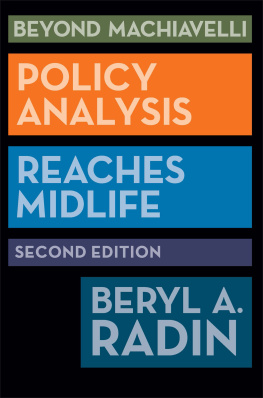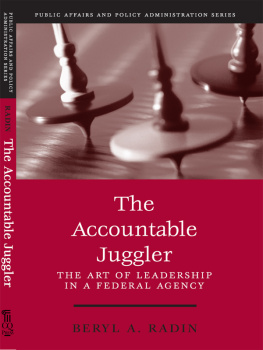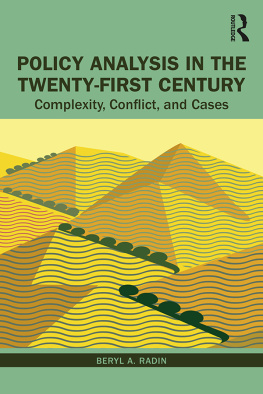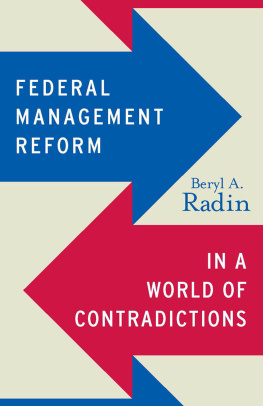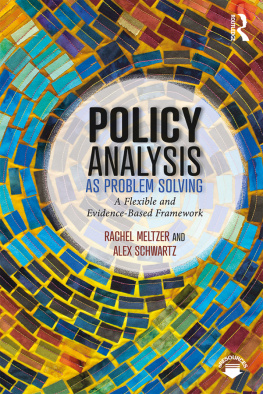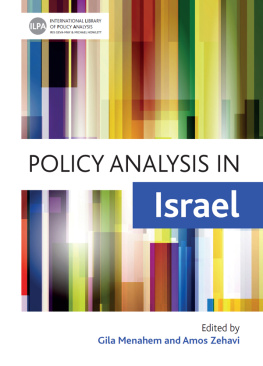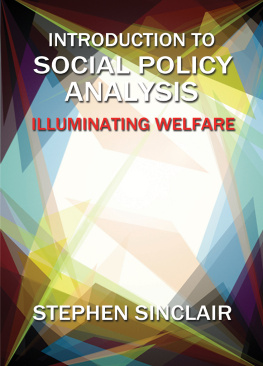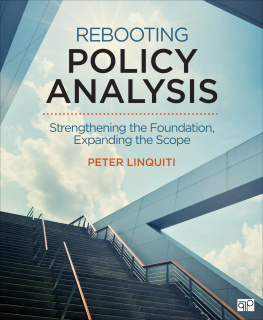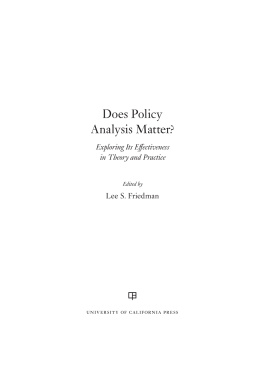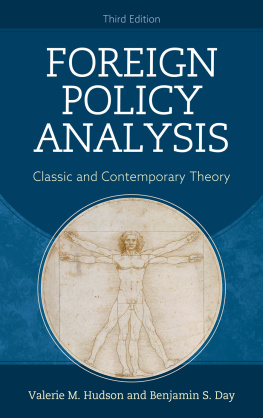2013 Georgetown University Press. All rights reserved. No part of this book may be reproduced or utilized in any form or by any means, electronic or mechanical, including photocopying and recording, or by any information storage and retrieval system, without permission in writing from the publisher.
Library of Congress Cataloging-in-Publication Data
Radin, Beryl.
Beyond Machiavelli : policy analysis reaches midlife / Beryl A. Radin. 2nd ed.
p. cm.
Includes bibliographical reference and index.
ISBN 9781589019584 (pbk. : alk. paper)
1. Policy sciences. I. Title.
H97.R33 2012 320.6dc23
2012023482
This book is printed on acid-free paper meeting the requirements of the American National Standard for Permanence in Paper for Printed Library Materials.
15 14 13 9 8 7 6 5 4 3 2 First printing
Preface to the Second Edition
More than a decade has passed since the first edition of this book was published. Although significant elements of that volume continue to be useful to students and scholars of policy analysis, much has changed during these years. These changes have occurred both in the field itself as well as in the environment where its practitioners work. Thus the field is constantly changing, and in some ways this book confronts a very different world than the original book did when it was published in 2000. As such, for the book to continue to be relevant to students and scholars, it had to be modified.
When I wrote the preface to the first edition, I noted that I had based it on many years of teaching, practicing, and talking about the policy analysis profession. Up to that point, most of my experience had been within the borders of the United States, and the field of policy analysis was assumed to be a set of activities that was largely limited to the United States. Since that time, however, the field has become globalized. This has happened in several ways. First, policy analysts are now found in many parts of the globe. Although they share some assumptions and methods, these shared activities take place in political structures that are quite different from that in the United States and in political cultures that approach analytic activities in diverse ways. Second, policy analysis has changed the way that US analysts think about the boundaries of the systems that define their tasks. Even a decade ago, there appeared to be a clear differentiation between domestic and international issues. Today, however, that differentiation is much less clear. Globalization has meant that policy issues transcend the boundaries of the United States in terms of both substantive policies as well as economic conditions. Both the economic crisis of the twenty-first century and concerns that emerged from the experience of the September 11, 2001, terrorist attacks indicate that decisions and problems have little respect for national boundaries.
Over the past decade an already messy decision-making world has become even more complex. In part this was a response to globalization but it is also an acknowledgment of the fuzzy boundary lines between public and private sectors and a movement away from a belief that decision making followed a hierarchical model. Traditional decision-making processes have often been replaced by decision making that involves networks and collaborative as well as conflictual processes. Networks increasingly draw on intergovernmental relationships (crossing bureaucratic lines) and, as well, involve both for-profit and nonprofit actors in hierarchical as well as horizontal relationships. It is extremely difficult to figure out who is the client for the analyst in these network situations.
Another major change that has taken place since 2000 involves the relationship between analysis and politics. When the original book was published, it did include a chapter titled Dealing with Two Cultures: Politics and Analysis. That discussion largely focused on the differences between the two approaches, drawing on C. P. Snows framework that describes the conflict between two very different cultures. But in the decade that has passed, it has become increasingly difficult for policy analysis to find a way to approach contemporary issues without succumbing to dramatic pressures that emerge from various forms of politics. It is often difficult to differentiate politics from analysis in a world where politics is entwined with the consequences of the fiscal crisis both in the United States and worldwide. What we now define as politics is a result of not only the formal structures of government and governance but also of the complexity from globalization and policy networks. It is difficult to determine whether analysis belongs to a long-term perspective and political realities always lead one to short-term approaches.
This book was written during a period when reliance on any form of analytic approach has become an act of hope. Thus the result of these changes has not always been positive to someone who had great expectations about the impact of analysis on the quality of decisions. Analysts too often face what many view as an unholy dilemma. They either buy into the political and ideological perspectives of their clients (the decision makers they seek to advise) or retreat into narrow and technical methodologies that are doomed to be ignored in the decision-making process.
Finally, as a result of these changes, there have been significant shifts in the way that the field has defined itself. Although there was never unanimous agreement on the dimensions of the paradigms, methodologies, and concepts of success in the policy analysis enterprise, there are even stronger disagreements in the field today. Increasingly, the difference between policy research and policy analysis is ignored even though the perspectives of the two seem to be quite different. The list of skills and capabilities required for policy analysis grows longer and longer but there is disagreement about priorities to be emphasized between the items on that list. These conflicts are particularly important for those who are responsible for producing new entrants into the field and thus are found in the different assumptions that define the various academic institutions offering masters in public policy degrees. They also emerge from decreased reliance on strong communication between practicing policy analysts and the faculties and students in the academic world.
Although much has changed, this book continues to represent my attempt to synthesize and make some sense of the often-incomplete answers that I have given to the questions raised by public policy analysis students at the five universities where I have taught as they have envisioned their careers in this field. These students have pushed me to reflect on the practice of policy analysis and to attempt to sort out a range of issues that seem to be central to the profession.
I came to the policy analysis field as someone who, before becoming an academic, had already watched the policymaking process as both an activist and an individual working inside a bureaucracy. Indeed, I often describe my career as one of a pracademic, someone who has spent time in both the academy and the world of practice. As one concerned about policy change, I was chagrined to watch the decision-making process close at hand. I certainly resonated to the saying, If you like the product, dont watch the process of making either sausage or policy.

